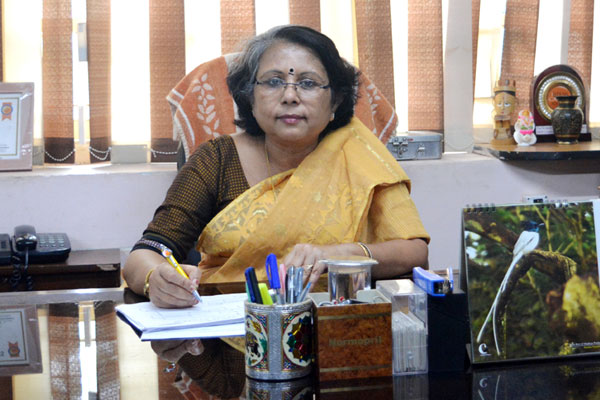
View Mentorship Gallery
Mentorship Policy Statement
Gokhale Memorial Girls' College (GMGC) has adopted a Mentorship
Program to facilitate enhancement of various skills of students,
starting from the initial years of under-graduate study to a
wider spectrum. Mentoring, at its core, helps one to grow as a
person and become the best version of oneself.
Mentoring is usually face-to-face and conducted over a
sustained period of time.
Mentoring in education involves a relationship between two
people where the mentor plays a supportive and advisory role for
the student. i.e. the learner. This relationship promotes "the
development and growth of the latter's skills and knowledge
through the former's experience"
Mentorship is crucial to high-quality education because it
promotes individual development and growth while also ensuring
the "passing on" of skills and professional standards to the
next generation.
Mentorship programs are usually offered to support students
in program completion, confidence building, and transitioning to
further education.
This may involve helping students achieve their personal or
career goals, introducing them to new ways of thinking,
challenging their limited assumptions, sharing valuable life
lessons, and much more. Ultimately, mentoring connects a young
person to personal growth and development, and social and
economic opportunity.
Both Direct and Cross Mentoring are conducted by the faculty
in GMGC. Direct Mentoring is conducted by the mother department
faculty and Cross-Mentoring is inter departmental.
The Rationale
Direct-Mentoring by a familiar faculty helps the mentee to
shrug off inhibitions and fears and approach the subjects chosen
in her under-graduate level with greater interest and attention,
thereby contributing to the academic advancement of the
understudy. Cross-Mentoring helps the mentee to share
observations on teaching-learning experiences, aspirations,
campus expectations and such others which she cannot share with
her own faculty. Mentorship in both forms would promote a
sustained faculty-student relationship to the ultimate benefit
of the institution.
As envisaged and laid out in this policy statement, the
specific benefits of being mentored in both forms of mentoring
would include:
- being guided in a special manner in the chosen
discipline;
- being encouraged and empowered in personal development;
- being helped to identify and achieve career goals;
- being helped to identify and fill in gaps in generic
skills and knowledge;
- being able to harness life skills and social skills;
- being able to communicate the shortfalls if any in the
teaching-learning process; infrastructure facility; staff
demeanour; peer relations and such and express the desire
for remedy.
For a successful mentorship program, the college strives to
fulfil the following requirements :-
Drawing up the Scheme -
Mentees are the students. Fulltime teachers are the mentors.
Direct mentoring would be conducted by own department faculty
and cross-mentoring by other department faculty. All students
should be assigned to respective full time
teachers and all fulltime teachers to students.
In order to carry out group mentoring successfully, a single
mentor is matched with a cohort of mentees.
Identifying the responsibilities of the mentor and the mentees
From fostering confidentiality in the relationship to sharing
core values, there are several responsibilities that both
mentors and mentees should take on to cultivate a successful and
mutually beneficial relationship. They are:
- Foster Confidentiality- A mentor should provide guidance
and support, while a mentee should be coachable and willing
to learn. Additionally, a mentee should have an open mind,
be respectful and be able to take
feedback positively. A good mentor-mentee relationship is
built on trust, mutual respect and a shared commitment to
learning.
- Recap and update - Mentees should always end a mentoring
session by recapping the main takeaways from the
conversation. It allows the mentor and mentee to establish
an action plan for the future momentum into their
next meeting. The following mentor session should begin with
an update on progress on the action taken that was desired.
- Cultivate a Teacher and Pupil Relationship- A Mentor
should not only serve as a positive role model, but should
know how to offer guidance in an effective way. Likewise, a
mentee should crave for this guidance and
be teachable.
- Build Trust through Engagement - The mentor/mentee
relationship is all about engagement. The mentors should
teach by example and always lend a good ear to the mentees
to unlock their inhibitions and/or the
creative instinct of their mentees. Mentee should always be
open to listening to exploring new creative ideas.
- Find answers to Open-Ended and Curious Questions -
Mentees should feel free to question mentor with open-ended
and curious questions - with due respect
- Facilitate Learning Opportunities - Mentorship is a
transference of knowledge, so it is vital that the mentor is
familiar with and adept at creating learning opportunities
that correspond to the mentee's learning
style. Mentors should foster a relaxed, yet productive
atmosphere and utilize active listening skills.
- Getting Feedback both ways - Periodic feedback from the
mentee is essential. Mentee feedback is important for the
Mentor as the latter needs to know if the guidance he/she is
providing is being absorbed by the
mentee and if it is useful to furthering the mentee's
understanding and knowledge base. Mentor too should provide
a feedback on the mentees' progress.
- Follow-through - This is the responsibility of both the
mentors and the mentees. Mentee's responsibility is to seek
out opportunities and experiences to enhance her learning
and communicating with the Mentor
as and when required. Mentor should inquire as and when
possible.
- Share Core Values - The mentor and the mentee should
have compatible core values which can be shared for
development of sustained mentormentee relationship.
Therefore the core actions of Mentors need to be as follows:
- ask questions.
- share ideas as Mentees value their opinion.
- listen with compassion.
- offer encouragement.
- introduce mentees to values, ethics and real life
situations.
- willing to accept the mentees' viewpoints and offer
constructive criticisms.
- help in alternative interests and diversification.
- help and guide students in a SWOC analysis.. It is the
Mentor who can guide the student through a SWOC analysis of
her potential, capabilities, aspirations, actions, prospects
and inhibitions. Successful mentorship can help student to
evaluate himself/herself on his/her own and cope with all
difficulty levels.
- be non-judgemental.
- be honest and candid.
At the end of the mentoring process, a feedback from the
Mentees would be sought, to see how much they have benefitted
from the Mentorship programme. Student feedback on mentoring
will bring out the effectiveness of mentoring and how much the
mentors have been able to help young students to shape their
personalities and guide them in achieving some valuable life
skills, social skills, career skills and such others.
Reports
Cross-Mentoring Report Dated 10.05.2023 & 11.05.2023
View PDF
Cross-Mentoring Report 15.09.2022
View PDF



